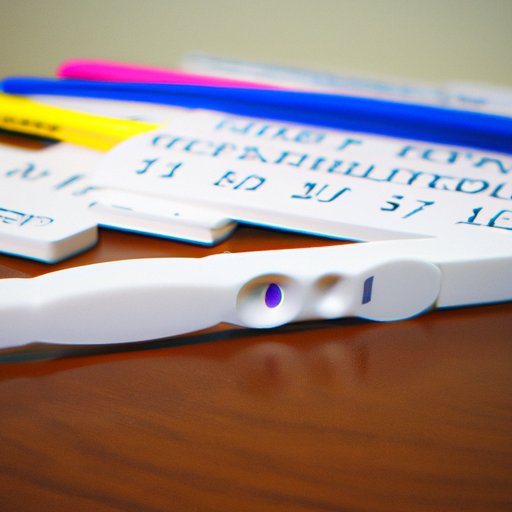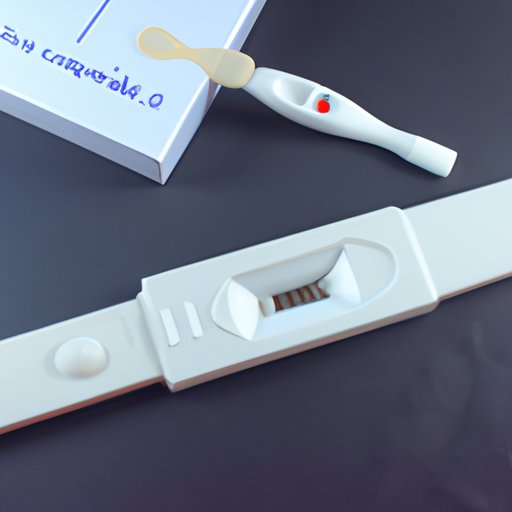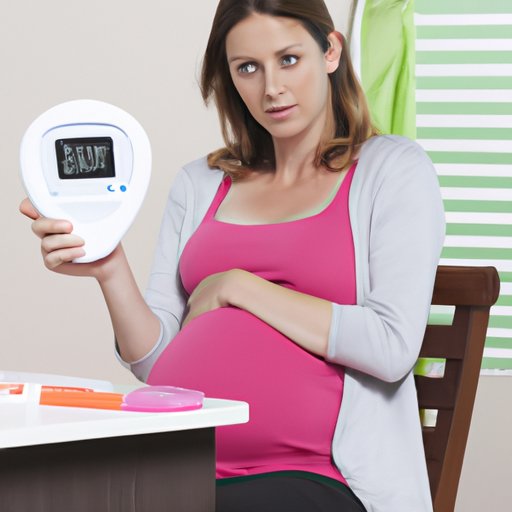Introduction
When trying to determine if you are pregnant, it is important to have an understanding of the timeline. Knowing when certain symptoms appear, when tests can be taken, and when results will be available can help you make informed decisions throughout the process. Early pregnancy symptoms can vary from person to person, but generally include nausea, fatigue, breast tenderness, and frequent urination. These symptoms can start to appear as early as one week after conception.
The purpose of this article is to explore how long it takes to find out if you are pregnant. We will look at the timeline of when you can expect to find out if you are pregnant, the different types of tests available, how home pregnancy tests work, and the pros and cons of waiting to confirm a pregnancy through professional testing.
A Timeline of When You Can Expect to Find Out if You Are Pregnant
Implantation of a fertilized egg typically occurs about 6-12 days after conception. Following implantation, hormonal changes begin to occur in the body which can lead to early pregnancy symptoms. Home pregnancy tests can detect hormones in your urine which indicate pregnancy, but are not always reliable until after your missed period. Therefore, the earliest you can take a home pregnancy test is typically 14 days after conception.

Exploring the Different Types of Pregnancy Tests and How Long They Take to Provide Results
Blood tests are considered the most accurate way to test for pregnancy and can detect hCG levels as early as 7-10 days after conception. Urine tests are less sensitive than blood tests and can typically detect hCG 12-14 days after conception. Ultrasounds are usually done to confirm a pregnancy and can be used to detect a heartbeat and measure the size of the embryo as early as 6 weeks after conception.

Understanding How Home Pregnancy Tests Work and How Quickly You Can Receive Results
Home pregnancy tests measure levels of human chorionic gonadotropin (hCG) in urine. hCG is a hormone produced by the placenta shortly after implantation. Home pregnancy tests are available over-the-counter and come in two varieties: midstream and strip. Midstream tests are similar to a dipstick and require you to pee on the stick directly. Strip tests require you to collect your urine in a cup and then dip the strip into the sample. Both types of tests typically provide results within 5 minutes.
Home pregnancy tests vary in accuracy. Most tests claim to be 99% accurate, however, false positives can occur due to user error or expired tests. False negatives can also occur if the test is taken too early. It is recommended that you wait until your missed period before taking a home pregnancy test.

Examining the Pros and Cons of Waiting to Confirm a Pregnancy Through Professional Testing
Waiting to confirm a pregnancy through professional testing has both advantages and disadvantages. One of the advantages is that you can receive more accurate results. Blood tests are considered to be the most accurate way to test for pregnancy, and ultrasounds can provide valuable information about the health of the fetus. Additionally, professional testing can provide peace of mind, as you will know for sure whether or not you are pregnant.
On the other hand, professional testing can be expensive and time consuming. Additionally, if you are not ready to share the news of your pregnancy with others, it may be difficult to keep the results confidential. Ultimately, the decision to wait for professional testing or take a home pregnancy test is up to you.
Conclusion
Knowing how long it takes to find out if you are pregnant can help you make informed decisions throughout the process. Symptoms of early pregnancy can start to appear as early as one week after conception, and home pregnancy tests can detect hormones in your urine as early as 14 days after conception. However, for more accurate results, it may be best to wait for professional testing such as blood tests or ultrasounds. Ultimately, the decision is yours.
(Note: Is this article not meeting your expectations? Do you have knowledge or insights to share? Unlock new opportunities and expand your reach by joining our authors team. Click Registration to join us and share your expertise with our readers.)
